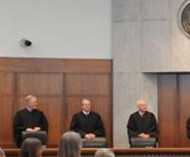11/4/2016
Federal Appeals Court Sides With Iowa Speed CamerasEighth Circuit US Court of Appeals spots procedural flaws in a pro-speed camera ruling, but otherwise agrees with prior decision.

A federal appeals court on Wednesday sided for the most part with a lower court judge intent on protecting speed cameras in Iowa (view lower court ruling). The three-judge panel of the Eighth Circuit US Court of Appeals concluded that the case filed against Cedar Rapids and Dutch speed camera operator Gatso suffered from major flaws, but that the lower court judge was a bit too eager to toss the case on procedural grounds. Lead plaintiffs Gary Hughes and David Mazgaj did not actually receive tickets and lacked standing under the federal system. However, that did not mean they lacked standing under Iowa law.
"The district court never had jurisdiction of Hughes and Mazgaj's claims," Judge William Duane Benton wrote for the panel. "Their claims should be remanded to state court."
Six other motorists also had their claims improperly dismissed because they failed to challenge their tickets in administrative hearing procedures that they believed were a "sham." The appellate panel reasoned that a courtroom trial is the appropriate venue for testing whether those hearings were unfair, not a preliminary hearing on standing.
"Otherwise, in order to have standing, a plaintiff would always have to show the inadequacy of the due process -- the central claim," Judge Benton wrote. "The allegations that the procedure is inadequate -- even if drivers shun it -- sufficiently establishes an injury in fact for Article III standing."
The case itself would not go much further, as the appellate judges were not impressed with the motorists' legal briefs challenging those administrative hearings. The panel said it could only act on concrete facts that showed a real risk that motorists would be erroneously deprived of their property.
"A court need not accept conclusory allegations," Judge Benton wrote.
The appellate panel also rejected a series of arguments that claimed the hearings deprived ticket recipients of their due process rights.
"The drivers allege that the automated traffic enforcement system infringes their right to travel because it is a 'speed trap' affecting the choices of interstate travelers," Judge Benton wrote. "A state may enforce conventional traffic regulations -- even if they deter travel -- without violating the fundamental right to travel."
While the lower court rejected the case in its entirety, the appellate court left the door open for parts of the case to be refiled with better arguments. A copy of the decision is available in a 150k PDF file at the source link below.


